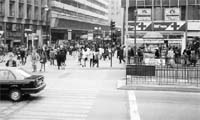Chile choked
Chile choked

AFTER air quality levels reached its "unhealthiest' level in 14 months , the Chilean government imposed anti-pollution measures in the capital, Santiago, in the last week of July. The government ordered 3,200 factories to halve their productive capacities and banned nearly all cars without catalytic converters from the city's streets.
Schools have also been asked to halt physical education classes and sports. "On days like this you can taste pollution on your tongue,' said one western diplomat who did not wish to be named. "It cannot be good for young children whose lungs are growing or for pregnant women,' he added. Local hospitals say hundreds of patients are complaining of breathing problems. "There has been a great deal of demand for medical attention regarding breathing problems,' said Francisco Rojas, a doctor at La Estrella Medical Centre in Santiago.
Contamination levels soared to dangerous levels late on July 25, forcing the government to enforce anti-pollution measures the following day. Western suburbs of Santiago experienced pollution levels that read 507 on Chile's contamination scales. Readings 500 and beyond are considered serious and dangerous to health.
The readings on July 25 were the worst since air quality reached 555 points on May 17, 1998. At that time, authorities suspended schools in neighbourhoods that had the worst pollution readings. Chile's southern hemisphere winter regularly causes thermal inversions over Santiago, with cold air trapping pollution close to the ground. The problem is compounded because of mountains around Santiago. Readings rise when there is little wind or rain to disperse the pollution.
Chile's contamination scale measures microgrammes of particles suspended per cubic metre. Readings between 101-200 are considered normal but can cause irritations. Those between 201-300 are poor, 301-400 critical and 401-500 dangerous.







